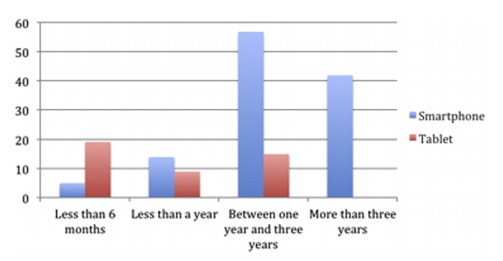 Smartphone and tablet use by level of experience.
Smartphone and tablet use by level of experience.
A new study in the Journal of Radiation Oncology looked at self-reported smartphone and tablet ownership and usage statistics in young, French, radiation oncologists. While the sample is quite specific and not necessarily generalizable, it does present an interesting look at the up-and-coming generation of physicians (most of the subjects had five years of experience or less).
The survey, conducted online among 131 members of a summer educational session for radiation oncologists, showed that 93 percent of the specialists owned a smartphone and 32.8 percent owned a tablet. The smartphone users were more likely to use their device at work than the tablet users: 78.6 percent of the residents owning a smartphone used it at work, while just 29.4 percent of tablet owners did so.
More than half of the residents (57 percent) used their smartphone more than five times a day, with another quarter reporting that they used it exactly five times a day. Most smartphone owners (91 percent) had at least one medical app on their phone, and 33 percent had more than five. Asked whether they had verified the validity of the apps on their phones, only 60 percent said they had. The survey also asked the oncologists which apps they used specifically.
"A total of 78 percent of the residents used their smartphone to take pictures of lesions for diagnosis, follow-up, or second opinion," the study authors wrote. "In line with this, 75.2 percent of them used utility apps for drug interactions, essential points, manufacturer contact, and so forth. Only 30 percent used their smartphone to search and read articles. In all, 68 percent of the residents also used their smartphone to calculate equivalent doses for radiation treatments. Even if these applications had been created for academic purposes only, 67.2 percent of the residents used them for medical purposes with direct consequences to the patients’ treatment, thereby breaching the apps’ End-User License Agreement."
The study also looked at the operating system of smartphones and tablets used. Sixty-two percent of residents had iPhones, 26 percent had Android phones, and 11 percent had Windows phones, while on the tablet side 84 percent used iPads and 16 percent had Android tablets.
Researchers also delved into residents' use of social media. They found that residents were much more likely to be on Facebook than Twitter, and most of them did not have contact with patients on these platforms. Seventeen percent had signed up for a dedicated physician social network, which they used to discuss cases anonymously with other physicians.

















